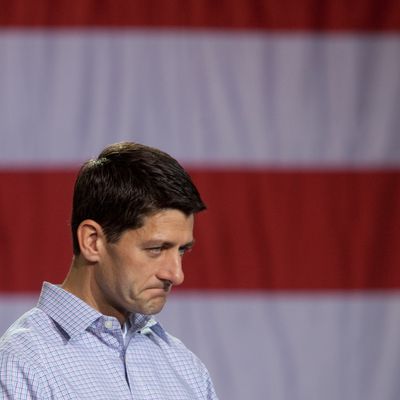
William Galston has a column today at the New Republic’s website arguing that President Obama will doom his chances of a second-term bipartisan deficit agreement by attacking Paul Ryan’s budget plan. If you’re not familiar with the Galston oeuvre, the mere fact that he is contemplating a second Obama term represents a triumph for the Obama campaign. Previous Galston columns have heavily emphasized his view that Obama is doomed, doomed, doomed, doomed, doomed, doomed, doomed, maybe not quite as doomed at that particular moment as he had been saying but still probably doomed, doomed, doomed, doomed, doomed, doomed … I’ve stopped my incomplete Google trail at this point, which is fall 2011, but you can go back to 2008 for more vintage Galston doomsaying.
Today Galston begins by explaining to his probably jarred readers that his thoughts have turned to more elevated topics than the doom, or conceivable lack thereof, of Obama’s campaign:
Many observers are working overtime to figure out which party benefits from Mitt Romney’s selection of Paul Ryan. I don’t mean to sound holier than thou, but I’m more interested in a different question: will it benefit the country?
I’m sure he doesn’t mean to sound holier than thou. Also, I don’t mean to say thou’s mother is a prostitute, but she offered me sexual favors, in return for payment. And then when I expressed shock at the offer she said, “Well, I am a prostitute.”
Anyway. Galston proceeds to argue that Obama is poisoning the well for a potential second-term bipartisan deficit-reducing deal, which he deems both plausible and crucial. Galston argues that Obama’s attacks on the Ryan plan “will rule out not only the Romney-Ryan plans, but also less draconian reforms that might be part of a long-term solution.” Galston wants a second-term Obama to cut a deal that includes Ryan’s current, and far less radical, plan to voucherize Medicare, but criticizing it now will make such a deal impossible.
Why? As precedent, Galston cites Obama’s 2008 campaign, which attacked John McCain’s plan to end the employer health-care tax deduction, and “made it impossible to include any robust version of that policy in the architecture of the Affordable Care Act.” The word “robust” is doing a lot of work here. Obama created a cap on the value of the employer health-care tax deduction rather than abolish completely.
Would it have been more “robust” if he had avoided attacking McCain? I don’t see why. Obama had attacked the individual mandate during the 2008 campaign, but reversed himself completely on that. The difference is that interest groups stood to lose a lot from capping the health insurance tax deduction and fought hard to limit the scale of the change, while interest groups stood to gain a lot from the individual mandate. Nothing about the political negotiations to craft the reforms suggest Obama’s campaign rhetoric played a major role.
Likewise, in 2008, both Obama and McCain favored a cap and trade bill. By Galston’s reasoning, this ought to have set the table for implementing the bipartisan consensus. In fact, all the Republican supporters, including McCain himself, abandoned the idea in short order. The precedent suggests that, whatever impediments might exist to the kind of deal Galston wants, Obama’s attacks making Paul Ryan sad are not among them.






























